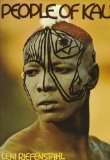The People of Kau
The People of Kau is the title of the 1976 English-language translation of German film director Leni Riefenstahl's Die Nuba von Kau, an illustrated book, published in the same year in Germany. The book is a follow-up to her earlier successful 1973 photo book Die Nuba.[1]
 | |
| Author | Leni Riefenstahl |
|---|---|
| Original title | Die Nuba von Kau |
| Translator | J. Maxwell Brownjohn |
| Illustrator | Leni Riefenstahl |
| Country | United States, Germany |
| Language | English (translated), German |
| Genre | Illustrations |
| Publisher | List (Germany) St. Martin's Press (US) |
Publication date | 1976 |
Published in English | 1976 and 1997 |
| Media type | Print (Hardback & Paperback) |
| Pages | 224 |
| ISBN | 0-312-16963-9 |
| OCLC | 36842357 |
| 306/.089965 21 | |
| LC Class | DT155.2.N82 R5413 1997 |
| Preceded by | 'Die Nuba |
| Followed by | 'Korallengärten |
Synopsis
This is a photographic monograph on the life of the people of Kau. Leni Riefenstahl spent 16 weeks with the Nuba of Kau in 1975. These people, known as the "South East Nuba", live only 100 miles away from the Mesakin Nuba. Yet, they speak another language, follow different customs, and are very different in character and temperament. Their knife-fights, dances of love and elaborately painted faces and bodies are represented in the book.
Critical reception
The most well-known critical reaction to Riefenstahl's photography of the Nuba came from the American intellectual, Susan Sontag. Sontag scrutinized the "fascist aesthetics" of these photo essays in her widely read essay "Fascinating Fascism". Writing in the New York Review of Books in 1975, she stated: "The fascist dramaturgy centers on the orgiastic transactions between mighty forces and their puppets". She continued "Its choreography alternates between ceaseless motion and a congealed, static, 'virile' posing." Sontag wrote that the collection was the "final, necessary step in Riefenstahl's rehabilitation. It is the final rewrite of the past; or, for her partisans, the definitive confirmation that she was always a beauty-freak, rather than a horrid propagandist."[2]
References
- Leni Riefenstahl (obituary) The Times. 10 September 2003
- Sontag, Susan (February 6, 1975). "Fascinating Fascism". The New York Review of Books. Retrieved February 9, 2018.